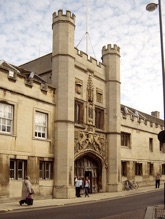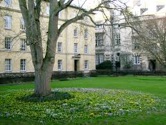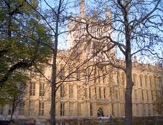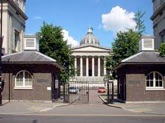glimpses of my life and thoughts
Colleges
Christ’s College, Cambridge 1943-1944
Spare a thought for the fresher whose life changes overnight from school pupil to university student. The change is dramatic. One day you have the protection and the comfort of home, and your only experience of education has been one of a timetabled day and bells ringing under the constraints of school discipline. The next day you are on your own — really on your own with total freedom to do more or less what you like, and no-one that you know to talk to.
On my arrival at Cambridge it was both exhilarating and overwhelming to enter this strange world. Modern communication technology makes the transition easier nowadays but even now a student may disintegrate mentally under the strain.
At the older universities you live in a time warp, many traditions unchanged for centuries. As you enter the Hall for dinner at Christ’s the oil paintings of John Milton and Charles Darwin look down on you from the wall above high table. You are part of history — beautiful old buildings everywhere and of course punting on the Cam.
Playing Squash took me to almost every college in the city.
Academically distinguished as the dons were, teaching and communication skills were more rare. It was often simply a matter of regurgitating material they had been using for years if not decades. Some were downright awful even at that. One of them, a lady who lectured on Strength of Materials, was so dreadful that we spent most of the time pelting her with paper darts and making rude noises. Eventually she simply walked out never to return — who said that Student Power is a recent phenomenon? But of course there were some excellent lecturers.
The city was inundated at nighttime by American marines stationed nearby. It could get very rowdy. Local girls were dated and entertained and . . . I’ll not go into the details of what went on in the garden immediately below my room. Our landlady was so furious that she once tipped a bucket of water onto the couple below. They too were furious.
For some reason that escapes me now I was supposed to have had an ambition to become an engineer. So I embarked on reading for a degree in Mechanical Sciences. It was a mistake mainly because apart from the mathematics I’d became less fascinated with the subject matter. And I’d taken a shine to another area of knowledge as far removed from engineering as you can imagine. Theology.
From an early age I’d been intrigued by what people believed in and why — about life and death, and what or who, if anything or anybody, is behind it all. A sceptic by nature, I was dismissive of irrational religious faith. So when approached by the Cambridge Inter-Collegiate Christian Union (CICCU) I would have nothing of their evangelical fundamentalism and their missionary zeal.
Then I came across a group of students at Christ’s who were members of The Students’ Christian Movement (SCM), a body which, although Christian in the broad sense, prided itself on having an open mind on many ultimate matters. I was welcomed into their circle. We frequently sat up into the early hours discussing and debating controversial issues such the notion of a god incarnate and other miracles. Or it might be politics. The college chaplain Ian Ramsey was of like mind, a lovely man who was my tutor in my second spell at Cambridge and eventually became Bishop of Durham. As well as the serious stuff there was much fun and laughter. All of them are now dead.
The upshot was that I abandoned the course with the intention of taking up theology. But as it was only science and engineering students who were exempt from military service, it was goodbye to Cambridge for the time being.
Christ’s College, Cambridge 1948-1949
Cambridge was a very different place when I retuned 4 years later. The age mix was much wider and there was more of a grownup atmosphere. Ian Ramsey was still there. He became my tutor and mentor for the remainder of my time. I enjoyed studying theology but the deeper I went into it the more sceptical I became, not just about the trimmings but fundamental tenets as well. I think I entertained the notion of becoming ordained with the mission of leading a second and far more radical Reformation of the Church of England. Ian persuaded me that this was a bit over-ambitious. So I decided to become a teacher instead.
I particularly enjoyed learning abut biblical criticism and attending the lectures of C H Dodd, author of a seminal book called The Authority of the Bible. His lectures were inspirational. And visual, since during the course of an hour he would walk around the platform full circle several times still talking away and gesticulating; so there were moments when we just had a view of the back of a sweeping gown and hood with hands waving.
Charles Raven, Master of Christ’s and a Vice Chancellor, was both charismatic and eccentric. On a warm Sunday afternoon from an upstairs room you could catch glimpses of him and his happy family all sunbathing in the nude on the other side of a wall totally oblivious to the possibility of onlookers.
Rooms in college were were comfortably furnished with armchairs. I had a separate bedroom and in an alcove there was a a single gas ring for brewing tea. The toilets were down 2 flights of stairs into the quad, then along into another staircase; and the bathroom was in the next quad. Your rooms were cleaned and the bed made by your faithful gyp. So it was a mixture of the luxurious and the primitive.
During the war and shortly afterwards the normal 3-year course was reduced to 2 years with the introduction of an 8-week term in the summer. Long Vac Terms they called them. So I was there for a total of 8 terms instead of 9.
London University 1949-1950
It was sad to leave Cambridge but it was time to move on again, this time to King’s College, London for a post-graduate course in education. In practice many of the lectures were held at University College.
The one-year course included a few weeks of teaching practice at Epsom Grammar School where my mentor was an eccentric teacher who greeted the top set in mathematics with the words, “Good morning, Cream”. He also taught the bottom set who were greeted with, “Good morning, Scum”. Amazingly both groups seemed to love it. He was an excellent teacher whose approach flouted the basic principles of received wisdom. It illustrates that you should never generalise about what makes a good teacher.
A highlight of the course was a residential few days in Holland visiting Dutch schools, and being royally entertained by the Minister of Education. One evening after a meal and more than one large glass of Bols Gin we were taken to a performance in the Royal Opera House in The Hague. Seated in the best seats and surrounded by Dutch high society I fear that some of us disgraced ourselves (me included) by joining in one of the well-known choruses.
As the end of the year approached I scanned the papers for vacancies and applied for a post to teach mathematics with some RE at Haberdashers’ Aske’s Hampstead School. A few days later the Headmaster rang me at the college to offer me the post subject to interview. I couldn’t believe my luck.


Christ’s College, Cambridge
Christ’s College
The Fellows’ Garden

Kings College, London

University College, London
